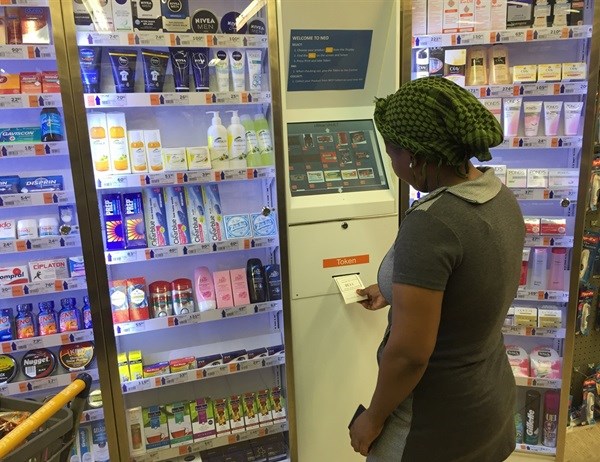With its new interactive aisle display, Quattro Management Systems aims to quell retailer woes relating to shrinkage of small but high-value brands and personal products, while also improving the purchasing experience of the shopper.
The placement of high-value brands and personal products – including sexual wellbeing products, pharmaceuticals and premium beauty items – behind counters or inside locked cabinets means shoppers don’t receive an on-shelf reminder and are inconvenienced by sometimes being made to join another queue to make the purchase. Worse still, a shopper could be looking for a personal product such as condoms or a particular medication that they don’t want to discuss with staff.
Whatever the reason, shoppers can’t exercise their immediate desire to buy. The store also risks the shopper choosing to go elsewhere, while the brand could lose the sale altogether if a cheaper rival is more readily available. But Quattro Management Systems believes its new display, dubbed Neo, can reverse these sales and brand equity losses and improve revenue by improving the interaction between brands and consumers.
Neo’s interactive aisle display allows a customer wanting to buy a certain item, such as a premium face cream, to find the product during their regular shopping journey in the aisle. At the display the shopper generates a token, pays for the product at any checkout and collects it on the way out of the store.
Ultimately, the display allows brands to advertise and promote their products, retailers to keep valuable stock safe, and prevents consumers from having to ask staff for 'back of the kiosk' product or personal care items.
Automated stock monitoring
Developed to be more than a stand-alone vending machine, Neo integrates the chain’s planogrammed aisle display with the store’s point of sale system. In this way, automated stock-monitoring enables it to predict when stock will run out and it creates many levels of analytics that can be used for planning. Overall, it counters the negative effects of removing goods from shelves and placing them elsewhere.
“The physical action of removing items from the aisle means that the general range gets depleted,” says Quattro Management Systems’ sales manager Ben Jansen van Rensburg. “The category in the aisle may consist of a hundred products, forming a distinct range that attracts shoppers. But the moment that you start decreasing the range, sales decline and brand values get depleted.”
The solution is currently being trialled in the aisles of selected Gauteng supermarkets and convenience stores. According to the company, a franchise store outside Mamelodi, Pretoria that's currently trialling Neo is experiencing double and triple-digit growth in premium brands that used to be removed from the view of browsing shoppers and left to languish in the cigarette kiosk.
Van Rensburg comments that various departments were consulted in the development of the Neo. “This solution affects purchasing, loss prevention, marketing, category management, even e-commerce. It has been important to us to get every department in a retail chain on board and get buy-in from the different role players.”






























